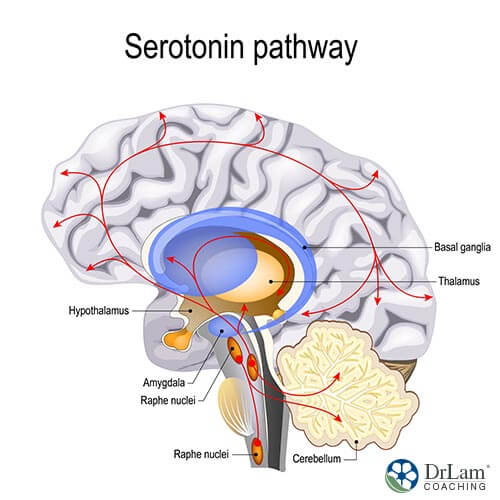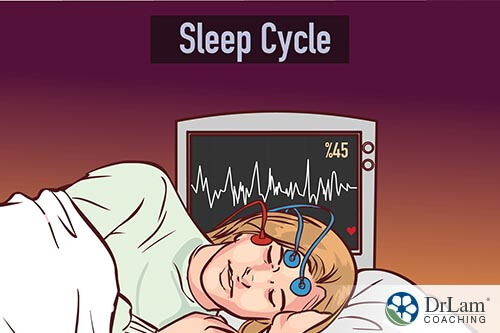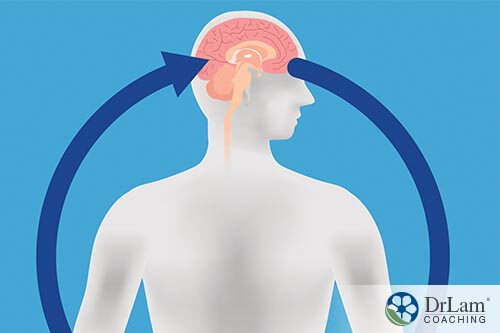 What is it that makes you happy? The answer can differ from person to person. Interestingly, there is one common factor that can make everyone happy - boosting serotonin levels in your body. Also referred to as the happy chemical, this unique neurotransmitter can significantly help enhance mood and induce relaxation and tranquility. Present naturally throughout your body, the chemical plays a major role in various body functions. Whether you are looking to keep yourself in the best mood, gleaming, or healthy, just work to boost the level of this happy chemical.
What is it that makes you happy? The answer can differ from person to person. Interestingly, there is one common factor that can make everyone happy - boosting serotonin levels in your body. Also referred to as the happy chemical, this unique neurotransmitter can significantly help enhance mood and induce relaxation and tranquility. Present naturally throughout your body, the chemical plays a major role in various body functions. Whether you are looking to keep yourself in the best mood, gleaming, or healthy, just work to boost the level of this happy chemical.
Scientifically referred to as 5-hydroxytryptamine or 5-HT, serotonin is one of the important neurotransmitters and chemical naturally present throughout your body, mainly in the central nervous system (CNS), blood platelets, and bowels. It is produced through a biochemical conversion process of tryptophan (a protein component) by tryptophan hydroxylase (TPH, a chemical reactor).
Though serotonin is produced throughout the body, a major portion of it is produced in the epithelial cells lining the gut. Research suggests that the gut microbiome plays a crucial role in stimulating the generation of serotonin.
Clinical research conducted on mice revealed that when compared to the germ-free mice, normal mice substantially produced more serotonin in their colon. With further investigation on the enzymes that hindered serotonin production, researchers found that low TPH1 enzyme in germ-free mice caused a drop in the serotonin molecule level. However, when fed with TPH1, the serotonin level in germ-free mice returned to normal.
Further, researchers also investigated the effects of specific bacteria on serotonin levels and found that spore-forming bacteria especially from the Clostridia category raised serotonin levels in mice. In addition, it was revealed that p-aminobenzoate, a-tocopherol, deoxycholate, and tyramine when given to the germ-free mice caused an increase in their serotonin levels. This showed that microbiome significantly affected the production of serotonin.
 The chemical is widely known as “feel-good” neurotransmitter or “happy chemical” as it helps stabilize stress, manage sleep cycle, as well as significantly contributes to well-being and happiness. Further, studies have linked this chemical neurotransmitter with enhanced mood, feeling good, and longer lifespan.
The chemical is widely known as “feel-good” neurotransmitter or “happy chemical” as it helps stabilize stress, manage sleep cycle, as well as significantly contributes to well-being and happiness. Further, studies have linked this chemical neurotransmitter with enhanced mood, feeling good, and longer lifespan.
The neurotransmitter communicates signals between your nerve cells. Though mostly recognized as a brain neurotransmitter, over 90 percent of this chemical is produced in your digestive tract. The remaining percent is generated in other parts of the body including the brain. This neurotransmitter is considered very unique as it inhibits certain functions in the brain and modulates certain neurotransmitters to ensure your brain responds correctly to various situations.
The neurotransmitter also plays a crucial function in transmitting messages between your nerve cells as well as is responsible for regulating several functions in the human body including digestion, appetite, mood, emotions, intimacy, and autonomic and cognitive functions.
A well-balanced serotonin level induces relaxation and brings your body to a relaxed state after the stress has passed. Your body is naturally equipped with the NeuroEndoMetabolic (NEM) Stress Response system for dealing with stress. It is a delicate network of various organs and six circuits including the hormonal circuit that work together in a very close coordination. During stressful situations, the NEM signals the adrenal glands, a pair of walnut-shaped glands present on the top of your kidneys, to secrete the anti-stress chemical cortisol. However, with constant stress, the adrenals can get overburdened reducing their cortisol secretion capacity. This can decrease your body’s natural stress-fighting ability which can lead to adrenal fatigue.
Experiencing extreme fatigue frequently along with symptoms of anxiety, insomnia, brain fog, difficulty in waking up, constipation, stubborn weight gain, and craving for salty and fatty foods could be signs of Adrenal Fatigue Syndrome (AFS). Following adrenal fatigue recovery protocols is essential for restoring your depleted adrenals. In people with chronic fatigue, the level of the feel-good neurotransmitter is found to be low. Boosting the level of this chemical can make you feel relaxed and provide relief from stress. Balance in the level of the happy chemical is one of the crucial factors for a successful adrenal fatigue recovery as well as the smooth functioning of your body.
The happy chemical plays a key role in the central nervous system and greatly influences most of the brain cells directly and indirectly. It also regulates the various functioning of the body especially the gastrointestinal tract. Studies have found certain links between this unique neurotransmitter and breast milk production, bone metabolism, cell division, and liver regeneration.
Various functions of the feel-good neurotransmitter or happy chemical:
Serotonin is a precursor for melatonin. It helps regulate the internal clock, sleep-wake cycle, and overall relaxation of your body. Any imbalance in this chemical can disturb your body’s circadian rhythm. People with AFS are more prone to disturbed sleep. Therefore, maintaining a healthy balance of this neurotransmitter can help in the adequate production of melatonin which is essential for a good restorative sleep.
Studies show that people with depression and mood disorder often have low serotonin level. The feel-good neurotransmitter produces a calming effect, thus enhancing mood, helping to fight depression, and keeping you happy. In fact, anti-depressant drugs provide relief from depression by altering the level of this happy chemical in your body.
Most of your body’s happy chemical is present in the GI tract. It plays a crucial role in regulating bowel function, appetite, and digestion. The chemical helps curb appetite and aids weight loss.
When you consume anything that is irritating or toxic, the gut produces more of these happy chemicals to decrease the transit time for expelling the toxins through diarrhea. This also stimulates the nausea region of your brain resulting in nausea.
When there is any wound or cut, the platelets release these neurotransmitters resulting in narrowing of blood vessels. This reduces the flow of blood and helps in the formation of blood clots.
 As this “feel-good” neurotransmitter significantly contributes to several crucial functions in the body, a well-balanced level of the chemical is pertinent for good health and overall well-being. Any imbalance in this chemical can give rise to a set of unpleasant symptoms exerting additional stress on your body which can leave you feeling fatigued.
As this “feel-good” neurotransmitter significantly contributes to several crucial functions in the body, a well-balanced level of the chemical is pertinent for good health and overall well-being. Any imbalance in this chemical can give rise to a set of unpleasant symptoms exerting additional stress on your body which can leave you feeling fatigued.
Increase in the level of this chemical can cause neurotransmitter imbalance further leading to hormonal imbalance, thus affecting the hormonal circuit of your NEM. Disturbance in the stress response system can give rise to various symptoms including
On the other hand, when the level of this neurotransmitter is low in your body, it can lead to various health issues that include
Therefore, when there is a drop in the happy chemical, working to boost its level is essential for restoring various functions of the body.
The feel-good chemical cannot be found in foods. So, one of the ways of getting this chemical from food is to eat tryptophan-rich foods as it is a precursor of serotonin. However, to boost the level of this neurotransmitter in your body, it is essential to combine tryptophan-rich foods with brain-healthy carbohydrates such as root vegetables, oatmeal, rice, and fruit. Carbs raise insulin levels which promotes absorption of amino acids leaving tryptophan in your blood for production of the feel-good chemical. Consider avoiding protein for some time as it can interfere with the production of the happy chemical. B-complex vitamins such as folic acids and thiamine can also affect the level of this chemical in your body. There are several ways to raise the level of the happy chemical in your body.
Top natural methods that can help boost the feel-good neurotransmitter:
Natural sunlight is one of the greatest sources of vitamin D. Moderate exposure to sunlight triggers the synthesis of the happy chemical. The brighter the sunlight is, the more your body produces the chemical. This could be the possible explanation for why people usually tend to feel gloomy on rainy weather. However, make sure to avoid exposure during the noon when the sun is at its peak. People with AFS should consider having sunlight exposure for a shorter time interval as they tend to have a weak body. Excess exposure can trigger fatigue symptoms.
 The happy chemical serotonin is basically synthesized from tryptophan, an amino acid which can be found in foods. Therefore, diets lacking in tryptophan can cause problems with low happy chemical levels which may lead to a set of unpleasant symptoms including headaches, depression, and sleep disorders. Tryptophan depletion is prevalent in people with anxiety, depression, and mood disorders. Scientists are doing more research to understand how tryptophan-rich foods affect the level of the happy chemical in the brain.
The happy chemical serotonin is basically synthesized from tryptophan, an amino acid which can be found in foods. Therefore, diets lacking in tryptophan can cause problems with low happy chemical levels which may lead to a set of unpleasant symptoms including headaches, depression, and sleep disorders. Tryptophan depletion is prevalent in people with anxiety, depression, and mood disorders. Scientists are doing more research to understand how tryptophan-rich foods affect the level of the happy chemical in the brain.
Further, research has linked a low-tryptophan diet with a drop in the level of the happy chemical in the brain. Therefore, eating tryptophan-rich foods such as cheese, raw milk, tofu, pineapples, fresh fruits, vegetables, sea vegetables, legumes, and greens can help boost the level of your feel-good neurotransmitter.
Nuts are rich sources of tryptophan as well as essential fatty acids, fiber, several vitamins, and minerals. They can boost the level of happy chemicals and good cholesterol that can help improve mood, promote sound sleep, support weight loss, maintain heart and respiratory health, and prevent cancer.
Body massage has been in practice since ancient times for correcting several health ailments. Scientific research now shows that body massage can reduce cortisol levels and boost the levels of happy chemicals by up to 28 percent, thus giving you a feeling of relaxation. The process can also help in providing relief from stress and adrenal fatigue.
Exercise activates the motor neurons in your body, thus boosting the level of the happy chemical. Further, regular workout also increases the level of tryptophan in your brain which helps in raising the level of the feel-good neurotransmitter.
Besides being rich in powerful antioxidants, green tea contains 1-theanine, an essential amino acid that boosts the level of your feel-good neurotransmitter.
Alterations in mood done through self-induction or psychotherapy can also help in raising the levels of happy chemicals in your body.
Turmeric is a natural antidepressant that can help enhance your mood. Curcumin in turmeric is loaded with amazing brain-boosting and anti-inflammatory properties which help restore the production of neurotransmitters and protect your body from inflammation.
This delicious healthy treat is loaded with flavonol and resveratrol that help enhance blood flow, relax the arteries, give you a sense of relaxation, and increase the levels of feel-good neurotransmitters in your body.
Certain foods can raise or lower the level of the feel-good neurotransmitter in your body. Consider staying away from inhibitors like caffeine, alcohol, and diet soda.
 Serotonin is an important naturally occurring neurotransmitter in your body that communicates signals between your nerve cells. Also referred to as the happy chemical or feel-good neurotransmitter, it enhances mood, induces relaxation, and provides relief from stress. The neurotransmitter is also responsible for carrying out several crucial bodily functions including digestion, appetite, mood, emotions, intimacy, and autonomic and cognitive functions.
Serotonin is an important naturally occurring neurotransmitter in your body that communicates signals between your nerve cells. Also referred to as the happy chemical or feel-good neurotransmitter, it enhances mood, induces relaxation, and provides relief from stress. The neurotransmitter is also responsible for carrying out several crucial bodily functions including digestion, appetite, mood, emotions, intimacy, and autonomic and cognitive functions.
Over 90 percent of this neurotransmitter is produced in the gut. A healthy balance of this unique happy chemical is essential for good health and well-being. Any imbalance can cause disturbance to your body’s natural circadian rhythm giving rise to various unpleasant symptoms. This can exert stress on your body leaving you fatigued. Exposure to natural sunlight, a tryptophan-rich diet, body massage, regular exercise, minimizing inhibitors, including foods such as green tea, nuts, dark chocolate, and turmeric in diet, and mood induction are some of the natural methods that can help boost the level of the feel-good neurotransmitter in your body. Strategic eating, combining a tryptophan-rich diet with brain-healthy carbohydrates, and avoiding proteins for some time can also prove helpful in boosting your happy chemicals and staying healthy.
© Copyright 2019 Michael Lam, M.D. All Rights Reserved.
Exercising can greatly help in boosting your serotonin levels. All forms of exercise including aerobic sessions, biking, running, resistance training, and yoga trigger the release of mood-enhancing chemicals. Make sure to have resting periods in between your workouts to maintain energy levels. Remember not to over-exercise as it can leave you feeling fatigued instead.

